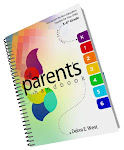Study: Third Grade Reading Predicts Later High School Graduation: Part 2
A wonderful "Reading Coach Trainer" from North Alabama sent me this article, and I felt like it was important enough to share with you. This is the second part of the article about a study on how a third grade students' reading ability will predict whether or not they will graduate from high school. Parents please pay attention.
By Sarah D. Sparks on April 8, 2011 9:36 AM
"Third grade is a kind of pivot point," said Donald J. Hernandez, the study's author and a sociology professor at Hunter College, at the City University of New York. "We teach reading for the first three grades and then after that children are not so much learning to read but using their reading skills to learn other topics. In that sense if you haven't succeeded by 3rd grade it's more difficult to [remediate] than it would have been if you started before then."
Mr. Hernandez analyzed the reading scores and later graduation rates of 3,975 students born between 1979 and 1989 in the Bureau of Labor Statistics' National Longitudinal Study of Youth 1979. He found 16 percent overall did not have a diploma by age 19, but students who struggled with reading in early elementary school grew up to comprise 88 percent of those who did not receive a diploma. That made low reading skills an even stronger predictor than spending at least a year in poverty, which affected 70 percent of the students who didn't graduate. In fact, 89 percent of students in poverty who did read on level by 3rd grade graduated on time, statistically no different from the students who never experienced poverty but did struggle with reading early on.
By contrast, more than one in four poor, struggling readers did not graduate, compared with only 2 percent of good readers from wealthier backgrounds. Mr. Hernandez found that gaps in graduation rates among white, black and Hispanic students closed once poverty and reading proficiency were taken into account. "If they are proficient in reading, they basically have the same rate of graduation" above 90 percent, Mr. Hernandez said. "If they did not reach proficiency, that's when you see these big gaps emerge."
For some children in the sample, Mr. Hernandez was able to track reading scores as early as 2nd grade, but not enough to do a separate analysis. It's interesting to me that since we don't do much testing before grade three, the first accountability point under NCLB, it's difficult to say exactly when these reading gaps emerge.
Mr. Hernandez is working on further studies on the nuances of these findings, including the effects of concentrated poverty—often associated with low-performing schools—and factors that make some students more resilient to poverty and early academic difficulty.
The study, "Double Jeopardy: How Third-Grade Reading Skills and Poverty Influence High School Graduation," will be posted by the Annie E. Casey Foundation.










0 comments:
Post a Comment